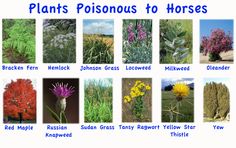Health can be defined as that state of total well-being that allows us to enjoy an optimal quality of life, not only for humans, but also for animals, and of course, this state of health is especially important for those who live with us or with whom we create a special bond.
Sometimes the condition of the disease comes from changes in the physiology of a living organism, but in many other cases what compromises health is an exogenous agent, which is not always a pathogenic microorganism, because sometimes the cause of the disease is a potentially toxic substance.
- It is also likely that our horse will get sick from the accidental ingestion of a harmful substance.
- So in this article we show you which plants are toxic to horses.
Although we maintain the immediate environment of our horse in the best possible condition, during a walk, our animal may be exposed to multiple dangers that have serious health consequences.
In this case, we are talking about berries, plants and herbs that our horse can easily access and that are dangerous not only because they can be toxic, but also because this animal has a delicate digestive system, and the ingestion of certain substances can cause colic and complications. It is important to check the area where the horse tends to graze to identify toxic plants.
Then let’s see which plants are toxic to horses that are also easily found in grasslands and pastures:
Previously we have seen the main toxic plants for horses, however, we can mention a few others, as well as other foods that should be kept away from this animal:
As we see, many substances can have a negative effect on the horse, so it is important to know these plant species and prevent the animal from eating them.
If your horse has been poisoned by a harmful plant, you will likely have some of the following symptoms:
If you notice any of the above symptoms on your horse, you should contact the veterinarian urgently.
To avoid ingestion of plants toxic to horses, we must provide our animal with an environment where it can safely graze and take extreme precautions when changing grazing areas.
The following tips will be very useful
Although identifying plants when they are not yet in bloom is a really complex task, you should think that this is the most effective way to protect your horse’s health.
If you would like to read articles similar to, we recommend that you visit our additional care section.

